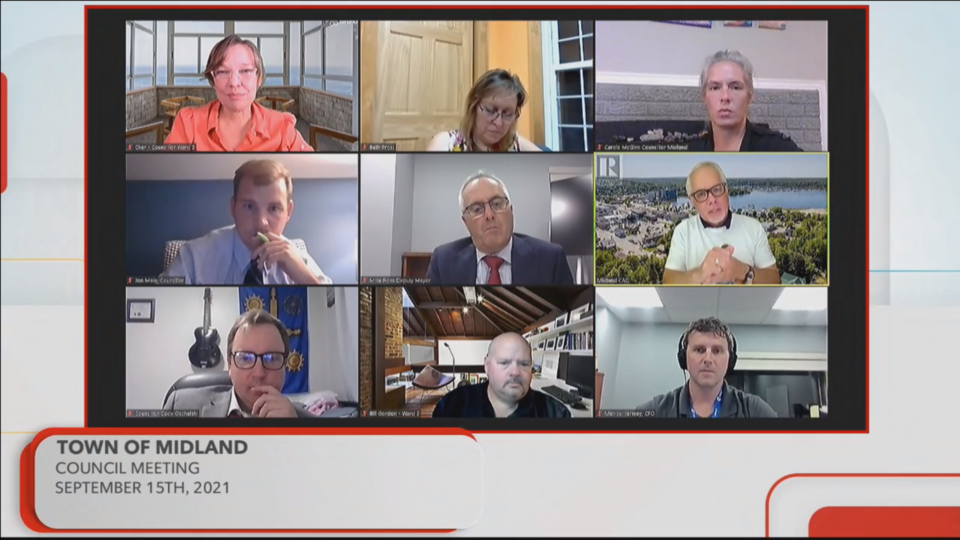The importance of physical and mental health and well-being throughout the pandemic influenced Midland council in discussing next year's budget.
A presentation for staff directions leading into the 2022 budget plan for Midland drew praise and encouragement toward greater recreation and open space planning, citing the “needs of the community” throughout the pandemic.
Michael Jermey, chief financial officer, provided an overview of the fourteen-page document that laid out how staff would approach the budget process this fall.
“The important thing that I need to emphasize here is that this is not council approving a tax rate increase,” explained Jermey. “This is merely for staff to use as some guidelines for preparing that draft budget which council will ultimately be reviewing, debating, making amendments to as they see fit, and ultimately seeking to approve for the end of January.”
Major elements in the report which Jermey brought attention to included a recommendation of 5% water and 4% wastewater rate increases required to sustain a system for safe drinking water, in line with a financial plan approved by previous council years ago; and an overall maximum rate increase before the county impact, based on the consumer price index for Ontario.
“It is also intended to recognize that the town is not insulated from the effects of inflation,” said Jermey. “Some of the examples that you’ll see through the report: the indices indicated that there’s roughly a 30% increase in fuel costs year-over-year, 18% increase in energy costs, and then within the town’s negotiated contracts themselves we’re looking about about a 1.75% increase for cost-of-living adjustments in relation to some of our collective agreements.”
Jermey added that newly-adopted legislation for infrastructure, such as inspections, cleaning, and licensing for stormwater management systems, would require additional workload and costs. He stressed the importance of getting the town back to bolstering financial reserves used to fund capital projects.
The conclusion of his presentation noted the blended tax rate increase, as it considers the town’s portion as being offered prior to the additional education portion and the County of Simcoe’s portion of the equation, known as the county impact, to arrive at the final amount.
Coun. Cher Cunningham mentioned the general fluctuation of prices due to the pandemic, and that the 2021 budget was based on 2016 MPAC (Municipal Property Assessment Corporation) calculations.
“In our conversations with MPAC,” replied Jermey, “at last check they are still waiting on the province to give them direction on when they are to do a new reassessment; that direction hasn’t been given yet. So yes, we are still using 2016 values.
“That being said, MPAC still is doing their work picking up growth-related assessment changes,” he added. “We are seeing a degree of assessment growth that will help the town with its 2022 budget pressures. When that reassessment does kick in, it’s going to result in changes across the board to assessed values. Typically, that becomes a four-year phase-in for any increases, where decreases are effective immediately.”
Coun. Jonathan Main stated that the lion’s share of a municipal budget goes to infrastructure, but COVID-19 provided a revelation of the town’s other requirements.
“This year going into the budget, we’re learning a lot more about the needs of our community through the pandemic. Maybe that should be reflective on our budget,” offered Main, suggesting further low-cost strategic initiatives be implemented.
“Outdoor rec is going to be pivotal,” said Coun. Bill Gordon who called the report “sobering”, and adding that new playground equipment for certain Midland parks was recently approved strategically, with more to come.
CAO David Denault shared excitement with the 2022 budget process, citing accumulated data for making more informed decisions with the draft such as a user pay system, where similar to water and electricity, residents are charged for town services they use as opposed to a blanket cost for everybody.
“We’re going to advocate for Midland in terms of the government funding that we get,” said Denault. “We went to AMO (Associated Municipalities of Ontario) and we made some presentations to a few ministries on our situation.
“The potential impacts of MPAC; again, the only reason we’re receiving funding from OMPF (Ontario Municipal Partnership Fund), the main source of funding to municipalities today -- the only reason we receive it today and the only reason we have received it for the last twelve years -- is because our assessment value is so low relative to the Ontario average,” Denault stressed, adding that the OMPF would start to diminish as the town’s assessment value gets closer to the Ontario average.
Staff will be providing agencies, boards and commissions for input on the 2022 budget draft through a questionnaire, which will be taken into consideration prior to the presentation for council’s approval.
The report on 2022 budget directions is available on the town of Midland CivicWeb Portal page.
Council meetings are held on the first and third Wednesdays of each month, and can be viewed on Rogers TV cable channel 53, or through the livestream on the Rogers TV website. Archives of council meetings are available through Rogers TV and on the Town of Midland’s YouTube channel.
